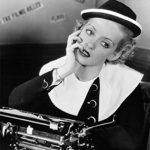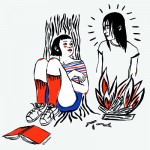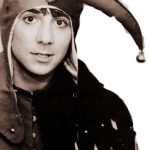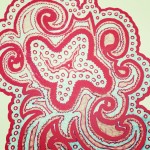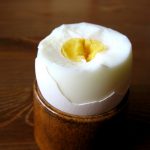A new short story by Naomi Richards
Support independent, non-corporate media.
Donate here!
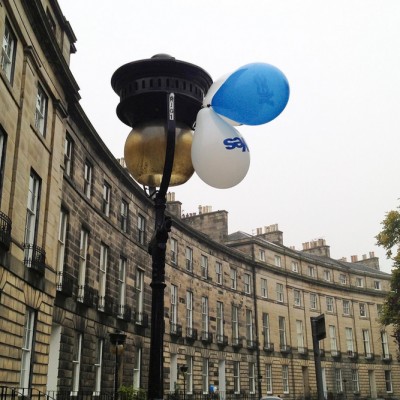
It’s the day before the referendum; I recognise your car, with no more than a sideways glance. You park illegally, outside the Turkish barber shop and the Chinese tea lounge. I move: an elongated shadow in my black uniform and peaked hat, making a slow-circle around a nearby parked car. You look in the shop window, but not for long, at stacks of tea boxes with blue lettering, at shallow wooden bowls of loose black tea, at a lucky white cat with a slow moving paw. You walk towards me. Over the cobblestones and the small trash of the city, through the traffic fumes that warm the air like invisible fires. Something different in your step today; a quickness, a lightness, an ease with which you move through the crowds. You are moving closer but seem distant.
I have persuaded you to make this arrangement, this weekly arrangement, because I am a man with magical luck. Only the mail interrupts us as it hits the wooden floor – other than that, there’s usually no sound as I undress you.
You are an aspiring actress, daughter of a Maltese captain; I am a man of thirty with an impressive collection of blue satin jumpsuits. Close by is your rented flat with a wrought iron bedstead.
We pass the cheese shop and the Sunday market. Long necks of game are stretched out and the eyes of the dead rabbits are shrunken as brown berries. Children point at the rabbits. Mothers hurry their children to the chocolate stall where Spanish sellers slice thin pieces of raw chocolate into glass bowls or to the flower-sellers with young sunflowers spiky as golden wands. A toddler runs over the cobblestones with a large pale blue Yes badge attached to her dress.
In the unlit windows of flats above the marketplace, Yes stickers are blooming: bluebells of hope in a dark wood. But you want to vote No.
I touch you lightly.
‘Let’s have coffee,’ you say.
I don’t want to wait.
‘I’ve an audition for a TV series,’ you say, stopping at a kiosk.
But you can’t remember your lines.
‘They want someone of mixed race.’
Your face is almost beautiful. I didn’t invent you. On top of your head is an abundance of wiry hair, a sort of dark honeycomb piled up. You paint your manicured nails black. I don’t want you sitting in a trailer in Glasgow. You might meet someone.
‘Let’s celebrate,’ I say.
After all wasn’t it my fine example that got you into acting in the first place? We met in The Calypso Club, when I was singing Burning Love and dreaming of Graceland.
‘I haven’t got the part,’ you say.
You sip your coffee leaning away from me, a man who brings good fortune. I imagine the light bulbs in your flat hanging naked and bald from their sockets. The red of your lipstick leaves a trace, a little flaw, on the whiteness of your teeth. Your tongue wipes it away.
*
You’re sitting in front of a dressing table, the colour of my father’s ivory piano keys. You file your nails, slanting the file in one direction and then the other. Beside us, a childhood photograph of you and your sister in Valletta. At the back of your dressing table, a figurine of Saint Rita, the patron saint of impossible causes and heartbroken women, that sometimes you light a candle to or touch for luck.
Home-made perfume blends stand in half empty glass bottles beside a leopard print pocketbook. In it you write lists of French verbs because you want to live in Paris someday. I open a perfume bottle. My flat is musky, rank as a cat. You adjust one of the fake pink roses glued around the top of the oval mirror. You’re wonderfully vain.
It is early afternoon and I have removed my walkie-talkie, remote terminal and mobile printer. I am standing in a pair of pale yellow socks and have gently displaced your shoulder-strap.
‘I want to stop this,’ you say and move the shoulder strap back.
I look at the curve of your high heeled shoes and then at the inhaler for your bouts of asthma and say, ‘You can’t.’
You look at my walkie-talkie and think of spotlights and a thick script with your name on it.
‘You have lovely eyes,’ I say.
They’re dark and filled with adjectives. You cross your legs, take out a cigarette and smoke climbs into your luxuriant hair. The phone rings; it’s your sister, Alexy. Your voice is low, conspiratorial, the way you always talk to your sister. On the coffee table there is a bottle of club soda and some white rum. I’ll mix myself a drink and wait it out. Although, I shouldn’t start drinking so early, I find it difficult to stop. I imagine stroking your shoulder, slowly, obscenely.
But when you finish the phone call you kick off your shoes.
‘I can’t go on with this,’ you say.
*
I let myself out. The streets are full of balloons and expectancy. I shuffle across the road, climb into my car and drive to The Parking Company to deposit my black heart and parking attendant gear. Aren’t there bars somewhere overflowing with jazz posters with golden trumpets that can swallow you whole? Where you can listen to Johnny Cash and dream?
I wake up. Lines of cars go by, they remind me of slowly moving grey fish. I look at my hands, observe the scratches on them. Wipe my mouth, taste blood. I must have passed out in this shop doorway and lain here all night. I feel kicked all over. The numbers on my watch blur. I have a couple of hours until my shift starts. I stand up. My neck is a rod of metal and my intestines twist. I feel sick. I phone your number. It’s engaged.
Walking down towards St. Stephen’s Church the voting has started. There are more balloons rustling like underskirts but tied to the railings. A tall, earnest looking man with spectacles stands beside red posters with yellow writing that says: No Thanks. A swell of people pour through the church and I stand and gape. A ginger cat flees up an alleyway.
Perhaps I should visit my father in his retirement home? There is always an ambulance for the heart that stopped or the skull that cracked on the stairs. Old ladies come out for funerals, as if for a breath of air.
I let myself into my father’s flat. He’s wearing a pullover and thin stripy tie, he’s bending over golden bell-shaped kaffir lilies in their glazed pots. He was over fifty when I was born. In the long mirror above the fireplace; the blood on my lip could be a smudge of lipstick. My father reaches out a thin greying hand and pats me on the back. One of his finger nails is flattened and thickened, disfigured and yellowed by an accidental hammer blow.
‘My girlfriend’s going to be in a TV series,’ I say.
He looks up; there is some interest in his face, before he returns to blankness. Similar to when I told him I met Shirley Bassey. He believes it, needs it, since Mum died. Sometimes I believe it myself. Then back to the kaffir lilies with their strappy leaves and roots that cure snakebite. My father tilts the watering can and liquid spills down the side of the pot, onto the worn carpet, onto the bottom of his trouser legs.
The blueness of my father’s eyes is thick, heavy. Once I bought him some corn-flowers and lavender, but he ignored them, not bright enough. He let them sink to the back of his mind.
‘Can I use the phone; I’ve got to contact an agent?’
He smiles.
In the hallway, I phone you.
‘Can I come round?’
‘No. I’ve told you. You’re a creep. You lie all the time.’
You hang up. I imagine you sitting slumped on your chair in your tiny black dress, blood running down your mouth and then I wipe the image away with a slow hand.
‘Please,’ I say.
My father stands by his piano playing the same note over and over.
‘It’s all set,’ I say, manoeuvring him gently away from the keyboard. He looks at the kaffir lilies.
‘Jazz trumpet,’ he says.
I make him a cup of tea then set out into the warm streets. Difficult as it is, I’ll try and forget about you. Let the people hurry by. The morning stretches out in front of me. I vote Yes.




